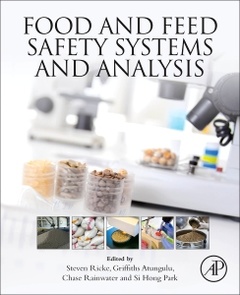Food and Feed Safety Systems and Analysis
Coordonnateurs : Ricke Steven, Atungulu Griffiths G., Rainwater Chase, Park Si Hong

Food and Feed Safety Systems and Analysis discusses the integration of food safety with recent research developments in food borne pathogens. The book covers food systems, food borne ecology, how to conduct research on food safety and food borne pathogens, and developing educational materials to train incoming professionals in the field. Topics include data analysis and cyber security for food safety systems, control of food borne pathogens and supply chain logistics. The book uniquely covers current food safety perspectives on integrating food systems concepts into pet food manufacturing, as well as data analyses aspects of food systems.
Food safety professionals in R&D; A&G; and corporate markets; students in food science/safety.
Dr. Griffiths G. Atungulu is the Director of The University of Arkansas Rice Processing Program and Asst. Professor of Grain Process Engineering. He holds bachelor’s, master’s, and doctoral degrees all in the field of agricultural engineering. He has worked on various aspects of biological and agricultural engineering, especially as related to
food processing and post-harvest systems engineering. At present, he directs research, teaching, and an outreach program that is focused on engineering and optimization of classical and innovative processing technologies to secure grain processing efficiency, automated quality monitoring and processing control, improved quality and shelf-life, and mitigation of mycotoxin formation. His rice research spans the areas of drying, chilling, aeration, milling, storage, and value-added processing. Research conducted has utilized lab- and field-based experiments, computerized mathematical modeling, and simulations tools to generate results and conclusions that advance science and positiv
- Explores cutting edge research about emerging issues associated with food safety
- Includes new research on understanding foodborne Salmonella, Listeria and E. coli
- Presents foodborne pathogens and whole genome sequencing applications
- Provides concepts and issues related to pet and animal feed safety
Date de parution : 10-2017
Ouvrage de 424 p.
19x23.3 cm



